Politics
Fear Of The Butcher’s Knife In New Delhi
Swati Goel Sharma
May 25, 2019, 01:57 PM | Updated Jul 01, 2020, 06:31 PM IST
Save & read from anywhere!
Bookmark stories for easy access on any device or the Swarajya app.
Now, the Hindu residents of such suburbs are searching for ways to ensure their safety. They are looking at the state, as well as within themselves.
Only three days remained for Holi but mood in Thakur Das's family was sombre. The family was grieving a young death.
The 65-year-old was sitting with his wife and younger brother in the balcony of his first-floor house. A heavy stone hit him. Another stone landed near his chair. He spotted two children on a nearby terrace, preparing to hurl more. An angry Thakur Das dashed to the house to confront their parents. It turned out to be a Muslim family living on rent.
Thakur says the parents did not take kindly to the complaint, and the two sides had a spat. A young man even caught him by his collar and tried to drag him inside a room, he says. Thakur left in panic. But much to his relief, the children stopped throwing stones.
Thakur Das was simply not prepared for what unfolded next. A mob turned up at his building with swords, bricks and stones, hurling abuses. He went downstairs and the mob pinned him to the ground. His brother rushed with a bathroom wiper and hit at the crowd, which injured a woman. Enraged, four men from the mob rushed upstairs with the weapons.
This correspondent has accessed several videos of the incident along with the related first information reports (FIRs).
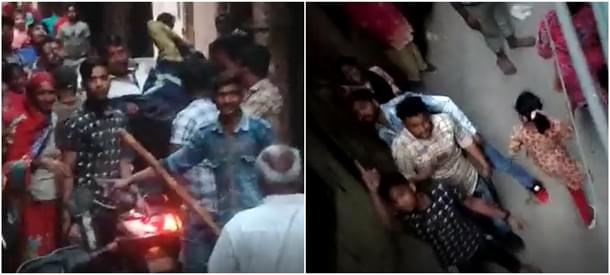
The mob vandalised Thakur's house and attacked his wife, 63, who was the only other person in the house. The men stopped only when the police arrived. Thakur sustained multiple fractures on his hand.
Such a violent reaction from a tenant family was unprecedented, says Thakur, a house owner in west Delhi's Sudarshan Park who has been living here for 45 years.
He later filed an FIR against the four men identified as Wasim, Dilshad Alam, Tajammul and Muzammil. The injured woman filed a counter complaint against Thakur and family, charging them with attempt to culpable homicide. The case is in court.
Thakur's son Shekhar tells this correspondent that when he went to the police station the next day, one of the accused told him, "I am Dawood Ibrahim".
He says the family has spent thousands of rupees in the "unnecessary court case". "If an armed mob vandalises your house, can't you even use a wiper in your defence?" he asks.
Shekhar however feels relieved. The murder of a local, Dhruv Raj Tyagi, by a tenant family in the adjoining lane has left him stunned. He says his father could have met a similar fate; the mob that attacked him were relatives of Tyagi's killers.
On 12 May, Jehangir Khan and his son Mohammad Alam stabbed 51-year-old Tyagi to death. The victim, who owns several houses and shops in the area, had confronted him to complain about his son who had molested Tyagi’s daughter. The butchers' knife used to kill Tyagi was provided by Jehangir's wife and daughter. The family didn't just kill but also reportedly mutilated Tyagi’s body- repeatedly stabbing his face, tearing off his fingernails and breaking his teeth. Tyagi's family says the two sides had no personal enmity.
Several neighbours huddle around as this correspondent speaks with Thakur's family. One of them, Nitin Gupta, says the residents are in panic and that something has to be done about "them". He means the Muslim tenants.
"They are criminal-minded people," he says. "Have you seen Hindu families bringing mobs with swords and bricks over minor spats?" Gupta spells out the concerns as other residents vigorously nod in support.
Sanjeev Gupta, another neighbour, says the "mahaul" (atmosphere) of the colony is worsening. "I have grown up in this colony. We also had differences with other families at times. But it never came to mobs and murders. All this is happening only now," he says.
The 'Muslim' immigrant problem
This correspondent has earlier reported that residents of Basai Darapur - an urban village in west Delhi - have been complaining about the increasing number and clout of "outsiders" for some years now. Hailing from Uttar Pradesh and Bihar, most immigrants are employed as labour in the many room-sized industrial units. They live on rent in one-room tenements that are available in abundance.
Immigrants began arriving a decade ago. Sensing opportunity, locals developed colonies with typically three-storey houses and two-three rooms on each floor. Each one-room set with toilet is rented for Rs 3,000-Rs 4,000. Landlords typically own anything between five to 50 rooms each.
Colonies are narrow and congested; houses are so close that families keep crossing into each other's space.
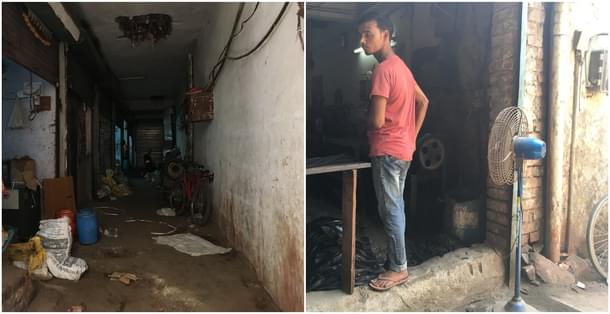
Locals estimate that almost 60 per cent of all tenants in Basai Darapur are Muslims.
As per Kapil Mishra, an MLA representing Karawal Nagar constituency in Delhi, this religious distribution is by design. "The previous Congress government actively settled Muslims in various pockets of Delhi. If in West Delhi, it's Muslims from Bihar, Uttar Pradesh and NCR [National capital region], it's Bangladeshis in Okhla and Bawana [south Delhi and north-west Delhi]," he says.
Mishra says that in several pockets in west Delhi such as Basai Darapur, Moti Nagar, Vikaspuri, Vishnu Garden, Khyala and Raghubir Nagar - that fall within a six- to seven-kilometre radius - this flood of immigration has brought about rapid demographic change.
Why 'majority' is in fear
When Mishra says this demographic change has led to a spurt in crimes, he only echoes the local perception and fear.
This correspondent visited several of these west Delhi pockets where residents talked about brutal mob-lynchings and cold-blooded murders of Hindus by Muslims in recent years. They also distinctly identify the immigrants with their religion as 'Momdons’ [lingo for Mohammedans].
Some of the particularly shocking incidents include Dr Pankaj Narang case, Ankit Saxena case and triple murders in Khyala.
In 2016, a largely Muslim mob descended on Dr Pankaj Narang's house in Vikaspuri and beat him to death using sticks and rods. Narang, 40, had scolded two men on a motorcycle after they brushed past his eight-year-old son who was playing cricket. The two men had left threatening with dire consequences and returned with a mob within minutes.
In February 2018, Akbar Ali, aided by his wife and brother-in-law, slit the throat of Ankit Saxena in the middle of a road in Raghubir Nagar. Saxena was in a relationship with their daughter. Residents told this correspondent last year that they knew Akbar's wife as a religious bigot; a Muslim woman said that Akbar's wife constantly pressured her to convert her Hindu husband to Islam if she wanted to avoid ‘dojakh ki aag’ (hellfire).
In January this year, Mohammad Azad went on a stabbing spree and killed three members of a neighbouring Hindu family - Veerpal, Sunita and son Aakash - to death in Khyala. Minutes before, Sunita had complained to her son that Azad said something to her when she was entering the colony; an angry Aakash had gone to Azad's house to confront him when the latter emerged with a meat chopper.
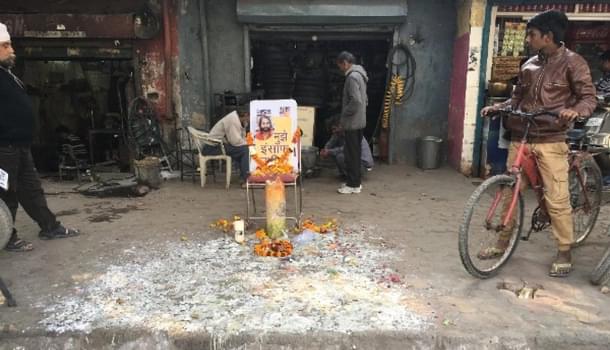
These incidents may or may not fit into the textbook definition of communal crimes, but residents perceive them as such and see their new Muslim neighbours as a threat.
Their perception stems from what they see as a pattern: unarmed Hindu victims confronted Muslim neighbours over trivial issues but were attacked later by mobs; increase in crimes with increase in the Muslim population; far from being peacemakers, Muslim women facilitated and participated in the attacks; killers used a butchers' knife that is a quintessential feature of a Muslim household; attackers showed signs of religious hate.
Rakesh Tyagi, who owns 15 rooms in Basai Darapur, says the Muslim community is largely "kattar" [extremist].
"What did Tyagi do to deserve it? Complain about the molester son? A Hindu parent would slap his son hard for doing this, not whip up a knife to kill," he says, and narrates what he has picked up of the case through neighbours:
"This lane is so narrow, hardly any vehicle can pass through it. Dhruv was on a scooter and asked Alam to give him space, but the latter abused him and touched his daughter on her back. Dhruv saw it in the rear view mirror. He was obviously furious. Any father would be," says Tyagi.
Tyagi said some of his tenants are Muslims, and while he wouldn’t ask the existing ones to leave, he would avoid renting to more Muslim families. "Sabko dar hai bhai [everyone is scared]," he says. "They all keep a knife at home."
Balendra Pratap, a local who runs a grocery shop and lives opposite Khan's house, told this correspondent earlier that his family perpetually lives in fear as "unke muh kaun lage" [who wants to get involved with them]. "They keep that big knife in their house," he said.
When this correspondent reported about Ankit Saxena's killing last year, residents had expressed a similar fear. The killer's neighbours said that that the way Saxena was murdered – “Akbar pulled his hair and sliced his throat in one swift move” – is to do with Akbar Ali’s “ease at killing”.
"Though here he worked as a driver, we knew Ali used to be a kasaayi (butcher). Every Eid, he would keep a goat for 10 days and slaughter it in his house. They also slaughtered chicken at the house regularly,” a neighbour had said.
In Basai Darapur, three men - all landlords - are sitting in an office opposite Jehangir's house. One of them, Raman Buddhiraja (name changed on request), snaps at this correspondent for asking if Tyagi's murder was being given a communal colour.
"What is it if not a Hindu-Muslim matter? Do you know Khan rushed to a mosque after the murder? Why did he go there? Have you seen Hindus rushing to temple after committing crimes?" he launches a volley of questions, and goes on to answer, "He went there for support. They have a mob mentality. Luckily, he did not find it and the mosque people asked him to surrender."
The family of Dhruv Tyagi has been telling the media that they do not see the murder as communal as “criminal has no religion”. When asked, Buddhiraja replies, “What else do you expect them to say in these hours of grief? They have all kinds of pressures on them.”
A stark change in local sights and culture brings about a threat perception too. Locals talk about how the "outsiders" take over streets in evenings, dotting them with biryani thelas and liquor "adde" (small gatherings). Young men, mostly Muslims, stands in groups, eager to molest and attack, they say.
Himanshu Chhabra says that as a child, he used to play badminton till midnight. The same streets are now avoided by residents after sunset.
Incidentally, Dhruv Tyagi’s killer Alam also sold chicken biryani for a living. His empty cart is still parked outside his rented room that is now locked.
Sonu Tyagi, a factory owner, says that Alam was involved in another "Hindu-Muslim fight" a month earlier and was out on bail. "He beat up a Hindu boy outside Tyagi dharamshala. His parents sent him to village but called him back on his mother’s insistence and got him married," says Sonu.
Tyagi says most families in his community do not even touch onion and garlic and the new “mahaul” is both unfamiliar and disturbing.
Muslim boycott - racism or a desperate call?
Kapil Mishra gives words to the local fear: "The Tyagis, the Jats and the Gurjars of Delhi have been warriors, fighting invaders and maintaining the Hindu character of the region. They are the natives, people with resources and clout. Now when they see Muslims brazenly killing them, they are naturally filled with panic," he says.
In Basai Darapur, almost all land is owned by Tyagis, Tanwars and Baghels. West Delhi itself is a cluster of villages populated chiefly by Tyagis and Jats. In Darapur, Tyagis are the biggest beneficiaries of the massive Muslim influx, both through rent and abundant cheap labour.
It is this panic that prompted a Delhi-based association of Tyagis to recently give a call for boycott of immigrant Muslims. After the murder, the association called a panchayat of caste members from over 70 villages - as far as Hapur in Uttar Pradesh and parts of Haryana - to discuss the viability of not renting property to Muslims and not employing Muslim labour. One of the organisers was Anand Tyagi, a first-cousin of Dhruv Tyagi.
Amreesh Tyagi, general secretary of the association, told the media after the meeting, “We have decided that no Muslim migrant should be given any house or shop on rent. We do not have any issue with the local Muslims here. We live peacefully here. But Muslims from outside Delhi create trouble here.”
When this correspondent visited the meeting spot - Tyagi dharamshala in Basai Darapur - on Wednesday, some elderly men were playing cards. They said the meeting failed to arrive at a consensus and had to be dissolved midway. "Some influential people suggested avoiding renting to Muslims. But some others vehemently protested the idea, saying it would kill their source of income," one of them said.
They explained why the community is divided on the proposal: Many house owners do not live in Basai Darapur and do not care. Most factory owners do not live here either. It's the resident house owners who are leading the boycott campaign.
A reality check reveals that the boycott appeal was only an act of desperation that was unfeasible if not unsavoury. A week later, it remains a knee-jerk reaction with little response.
Harjinder Singh, who runs a plastic mould-making unit near Jehangir's house, says his labour has committed no crime and there is no reason why he would ask anyone to leave.
Vivek Gupta, who runs one of the many fan-making units, says crimes are not committed by Muslims alone and he did not agree with some of the proposals of the association.
While some news reports said the meeting prompted several Muslim families to flee in panic, residents denied it. Aftab Alam, a student who lives on rent, says no tenant has been asked to leave. "If someone has left, it must be because of current tension. They will come back," he says.
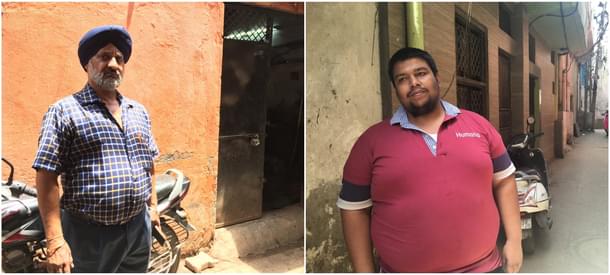
Manoj Tyagi, treasurer of Tyagi dharamshala, says that the purpose of the meeting was to make landlords aware “of the situation". "We do not want to spread anarchy by asking tenants to leave," he told this correspondent. When asked about reports on anti-Muslim slogans raised at the meeting, Tyagi says, "Some people may have said things out of anger - and it’s natural - but it was not an anti-Muslim meeting. It was a discussion for solutions.”
“At least we did not raise any 'tukde tukde' slogans," he says.
Such boycott calls are not limited to Basai Darapur. Residents have made similar appeals in Raghubir Nagar and Khyala too. They do not trust the police and realise that the solution has to be a community response.
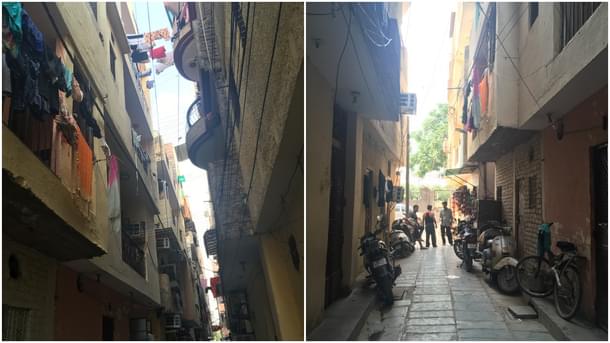
It's been more than a year since Ankit Saxena was killed. The house vacated by accused Akbar Ali's family now has Hindu tenants, the neighbours inform. Amreek Singh, a local, says that after the murder, residents formed a committee and appealed to all landlords to not rent houses to Muslims. Singh says no existing tenant was asked to leave but he knows of cases where interested Muslim tenants have been rejected for their religion.
In the Khyala colony where Veerpal and family were killed, residents speak of a similar move. This correspondent has earlier reported that after the triple murders, colony residents took steps to ensure the safety of a Muslim tenant family from a possible backlash.
Now, residents complain that one of the landlords ignored the decision and rented to a Muslim family. This has led to tension in the colony.
Sonia, who irons clothes for a living and was an eye-witness to the gory murders, says that when the new Muslim family shifted, the woman reached out to other families and spoke very nicely to all. But recently, she was heard saying loudly to a neighbour after a spat that everyone is not the same and she was not going to stab anybody to death. "She seems to be nice. But now there is always a chance that a fight takes Hindu-Muslim colour," she says.
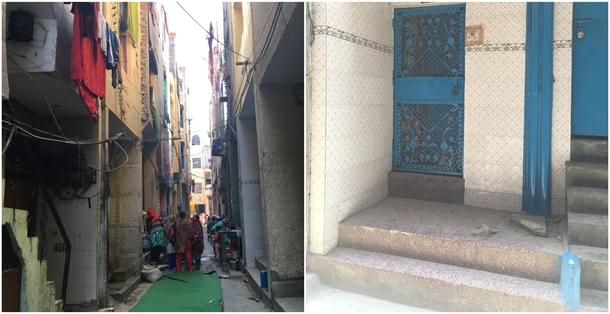
Azad's three-storey house, adjoining Sonia's, has been locked since January. A neighbour, without wishing to be named, says he heard the house has been sold but because no one has moved in, he is worried that the accused's family would move back sooner or later.
Fear persists in the affected areas long after the crimes. Areas differ but response to the fear is the same - boycott, which, by its nature, doesn’t work in entirety.
When this correspondent asked a resident in Basai why the boycott should not be considered racism, he in turn asked this correspondent if she wanted them to be killed for protesting the harassment of their daughters. "We are not cowards. If they kill, we will kill too. It is best to stay away,” he said - "they" referring to Muslims.
Clearly the locals, while wanting a regular supply of labour and rent, are resisting demographic change. It frightens them. Dismissing their fear or calling their solution an act of bigotry is not only lazy but also dangerous.
But is the state listening and does it have any solutions?
Kapil Mishra, a rebel Aam Aadmi Party (AAP) member, blames the Arvind Kejriwal-led government in the state for “emboldening” immigrants by sending all the wrong signals to the locals.
“You see how [Arvind] Kejriwal runs to Akhlaq or Rohith Vemula’s families in other states but doesn’t visit victims in Khyala or Basai Darapur. He met Ankit Saxena’s father only after a lot of pressure and even then, he leaves the meeting in between,” says Mishra.
He adds, “On the other hand, his minority commission is making ridiculous statements doubting the veracity of reports on Dhruv Tyagi’s murder. Why is the commission even interfering? It is because the state government is showing an open support to Muslim immigrants while alienating the locals.”
Mishra says a quick fix could be the government making verification of all tenants as well as declaration of weapons by all citizens in Delhi, mandatory.
Notably, the Moti Nagar police have set up a camp in Basai Darapur to enable landlords in getting verification forms filled by tenants and submitting to the police.
When this correspondent visited the area on Wednesday, response to the activity was insipid. Manoj Tyagi of Tyagi dharamshala said the police did not advertise it and thus many landlords who stay away are not informed about it. He also rued that the activity is voluntary and thus many landlords are giving it a skip.
Swati Goel Sharma is a senior editor at Swarajya. She tweets at @swati_gs.





